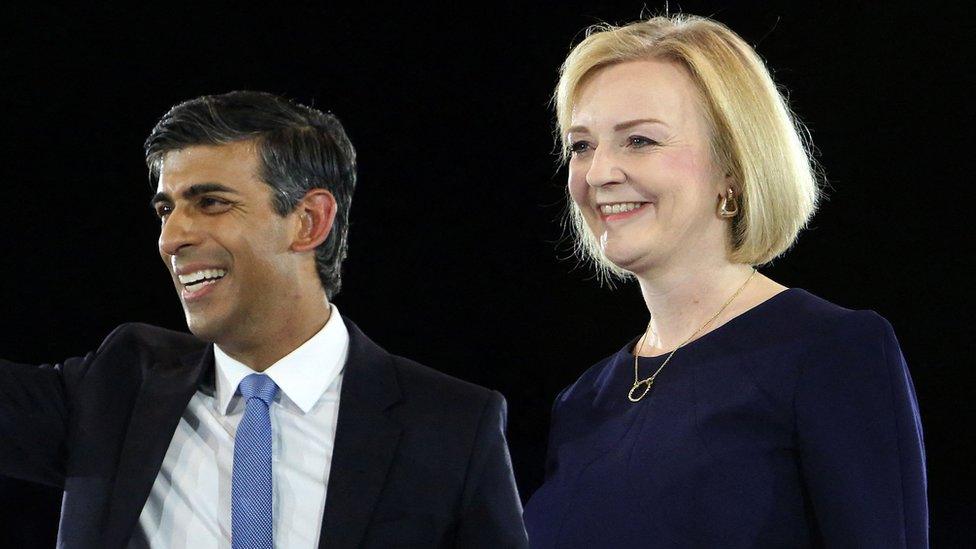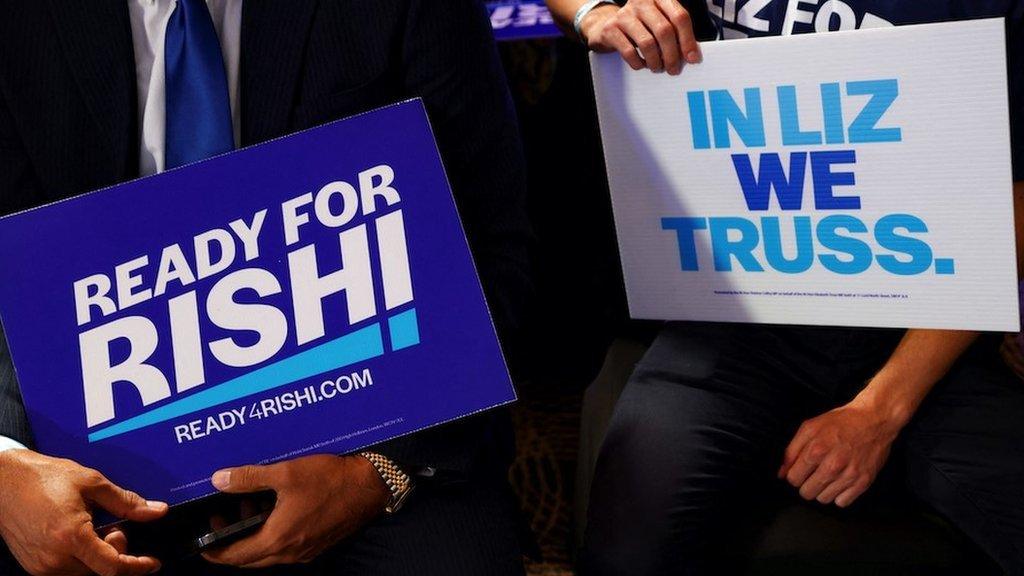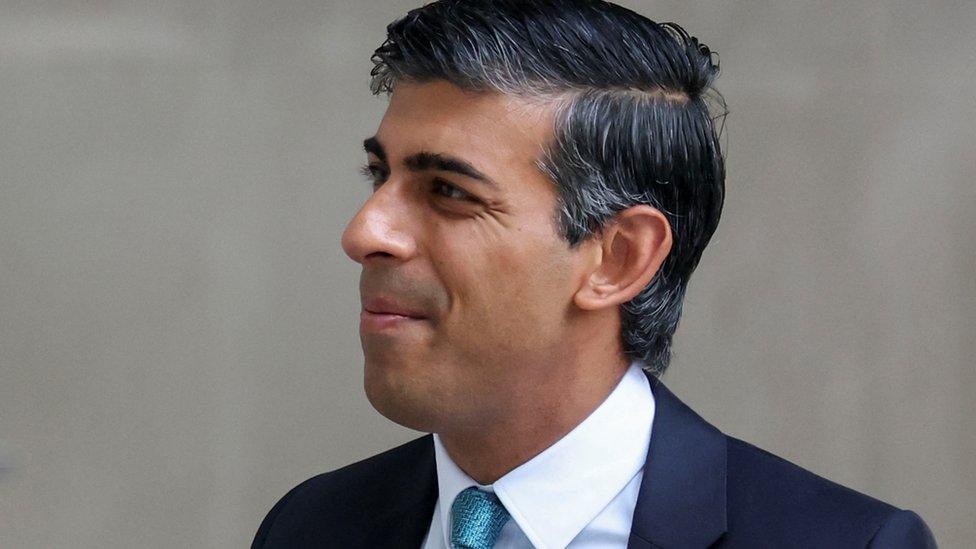Liz Truss or Rishi Sunak to be announced as UK's next PM
- Published
- comments

Boris Johnson's successor as UK prime minister will be revealed later when either Liz Truss or Rishi Sunak is named next Conservative leader.
The winner of the leadership contest, tipped by pollsters to be Ms Truss, will be announced at 12:30 BST before entering office on Tuesday.
The new PM will inherit a flagging economy, with inflation at a 40-year high and soaring energy bills.
Ms Truss has promised to "act immediately" to help with energy costs.
Unveiling details of a support package will be one of her first acts as prime minister, with an announcement pencilled in for Thursday.
Energy industry sources expect the incoming government to freeze energy prices, a possible move not denied by Ms Truss's team.
According to BBC political editor Chris Mason, Ms Truss has been working on her energy package for weeks, based on discussion with oil and gas producers.
She also plans to deliver £30bn in tax cuts through an emergency Budget later this month, arguing the UK's tax burden is behind sluggish growth.
Ms Truss's expected chancellor, Kwasi Kwarteng, has argued her tax-cutting agenda will boost business investment and economic growth.
Writing in the Financial Times, external, he blamed "economic managerialism" for years of low growth, adding "we need to be decisive and do things differently".
Mr Sunak, the former chancellor, criticised her tax-cutting plans during the weeks-long contest, arguing they would jeopardise the public finances.
The seven-week leadership contest brings to an end Mr Johnson's turbulent three years in office, and has seen the candidates regularly attack each other's policies as well as the Tories' record in government.
Mr Johnson was forced out in July by a ministerial revolt over a string of scandals, just over two-and-a-half years after leading the Tories to a landslide victory at the 2019 election.
On his final day in office, Mr Johnson will speak to Ukrainian President Volodymyr Zelenskyy on the telephone. He is expected to deliver a farewell speech upon leaving office on Tuesday, before the handover of power takes place.
Downing Street also anticipates further resignations from the government, from ministers who do not expect to be part of Liz Truss's administration, Chris Mason says.


There aren't many people around Westminster predicting anything other than Liz Truss being named the new prime minister.
Even Rishi Sunak's closest allies talk of him not losing by much, rather than winning.
If Ms Truss is named the victor just before lunchtime, one issue will define her early weeks in power: the cost of living.
She is planning a significant intervention this week, where tens of billions of pounds will be committed to helping with rising bills and inflation. That will include tax cuts and help for families and businesses. Expect her to also talk about an energy strategy to protect the UK against further turbulence in years to come.
After weeks of talking to Conservative members, the new prime minister will have to start talking to the country immediately. And the stakes are high, for voters are worried about their bills most of all. But also for the Conservative Party, worried about its future.
As one senior Tory put it to me last night: "If we get energy right, Starmer is beatable. If we don't, we're out."

Ms Truss is yet to offer details of her cost-of-living support plan beyond saying she will temporarily scrap green levies on energy bills and reverse the rise in National Insurance introduced during Mr Johnson's tenure.
Mr Sunak announced payments of £15bn as chancellor, including £400 payments for all households, but both contenders have said further support will be required after cost predictions rose further over the summer.
Labour and the SNP have followed the Liberal Democrats in urging the government to freeze energy prices through multi-billion pound subsidies, while the Greens have suggested nationalising the UK's five biggest suppliers.
Ms Truss did not rule out a freeze on Sunday, but has previously described Labour's proposals as a "sticking plaster" and argues more needs to be done to help the UK boost its domestic sources of energy.
She has said any further support would have to go "hand in hand" with efforts to boost nuclear energy, fracking for shale gas and more oil and gas drilling in the North Sea.
Watch: The BBC looks back at the two final candidates and their memorable campaign moments
The leadership race began in July, when the original field of 11 contenders for the Tory leadership was whittled down to two in a series of Tory MP ballots, with the final pair going into a run-off to be decided by the membership, which stands at about 160,000.
Although Mr Sunak had the most support among Tory MPs, he has trailed Ms Truss in opinion polls of the party grassroots.
BBC political editor Chris Mason says that uniting the Conservative party will be one of the new PM's tasks, with one long-standing MP expressing worries that as prime minister, Ms Truss might not reach out to as many Sunak supporters and offer them jobs as might be wise, and that could entrench divisions in the party.
In a break with tradition, the next Tory leader will travel to Balmoral Castle in Scotland to be appointed by the Queen, rather than at Buckingham Palace.
The Queen has been suffering from mobility issues and it is understood the change announced last week was made to prevent the need for any last-minute rearrangements.
Related topics
- Published4 September 2022

- Published4 September 2022
